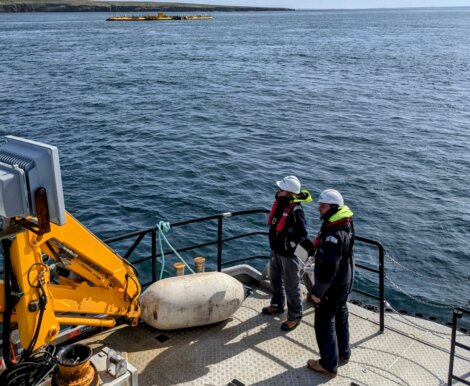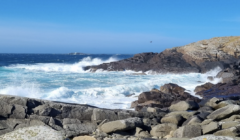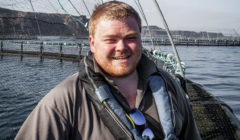Energy / Scientists deploy drones to map out tidal turbine challenges
SCIENTISTS in Shetland have been involved in a new study to understand the complex sea conditions facing tidal turbines.
Drones and boat-based surveys were used by the team as they looked to map out the tidal flows being encountered by the world’s most powerful tidal turbine, which is based in Orkney.
Unlike conventional tidal turbines Orbital Marine Power’s O2 floats on the sea surface, anchored by mooring lines to the seabed.
The platform is over 70 meters long and is connected to the grid at the European Marine Energy Centre, with estimates it could power 2,000 UK homes a year.
The study highlighted how changing tidal flows, that exceed eight knots, could impact the device and its performance.
A previous study by the lead authors found that a turbine wake generated a predictable foraging hotspot for nearby breeding seabirds.
However, if the turbine arrays are too tightly packed it could restrict the movement of some marine fauna.
In addition to seabirds, the authors encountered orcas travelling past the turbine during one of their drone surveys, demonstrating the importance of addressing this.
The study, published in Nature Communications, was conducted by researchers from the Marine Biological Association (MBA), the University of Plymouth and UHI Shetland.
Fisheries lead and scientist Shaun Fraser, who works at UHI Shetland, said the study showed “the benefits of combining scientific expertise and deploying new technologies so that significant progress can be made”.
“With further development of marine renewable energy infrastructure in the Highlands and Islands region likely in the near future, this work is more relevant than ever to local industries and communities,” he added.
The study’s senior author Alex Nimmo-Smith said we are going to see more offshore renewable energy platforms being installed all around the UK over the coming decades.
Become a member of Shetland News
“However, the natural conditions in the waters around the UK are incredibly varied and complex, something that it is impossible to fully replicate in controlled laboratory experiments or computer simulations.
“This study demonstrates a cost-effective means of countering that, and if we are to get the greatest benefits from the clean energy revolution, assessments that factor in real-world environmental conditions will be of critical importance.”
Become a member of Shetland News
Shetland News is asking its many readers to consider paying for membership to get additional features and services: -
- Remove non-local ads;
- Bookmark posts to read later;
- Exclusive curated weekly newsletter;
- Hide membership messages;
- Comments open for discussion.
If you appreciate what we do and feel strongly about impartial local journalism, then please become a member of Shetland News by either making a single payment, or setting up a monthly, quarterly or yearly subscription.













































































